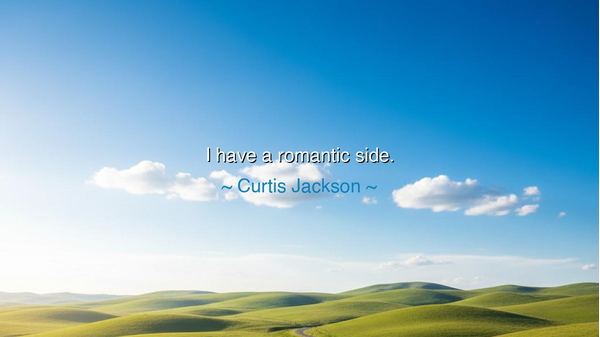
I have a romantic side.






In the simple yet profound words of Curtis Jackson, "I have a romantic side," we find a declaration of the duality that exists within the human spirit. To acknowledge a romantic side is to admit that even the most hardened of souls, those shaped by adversity and the toughest trials, are capable of embracing the gentler forces of the heart. It is a recognition that beneath the stoic exterior lies a desire for connection, for beauty, and for meaning—an inner world that seeks to be understood, touched, and shared. This glimpse into Jackson’s nature speaks to a universal truth: that romance is not confined to a specific type of person, but is an inherent aspect of the human condition, something that transcends circumstances and reveals the deeper longing for unity and love.
In the ancient world, the concept of romance was not merely about courtship or physical love. The Greeks celebrated eros not just as a desire for the other, but as a powerful, almost divine force that connected individuals to the eternal, the ideal, and the beautiful. In their mythology, gods and mortals alike were driven by romantic pursuits, seeking not only love but a connection to something greater than themselves. Take, for example, the myth of Orpheus and Eurydice. Orpheus, the greatest of musicians, moved the gods with his music, but his love for Eurydice was so profound that he ventured into the underworld itself to retrieve her. His journey—a journey marked by the tension between hope and loss—illustrates that the romantic spirit is often intertwined with great sacrifice, passion, and yearning for something transcendent. Even in the most challenging of circumstances, the romantic side seeks connection, even if it means defying the natural order.
The Romans, too, understood the power of romance. Their epic tales, filled with heroic feats and tragic love stories, were often centered around the struggle to find meaning through relationships. Virgil’s Aeneid tells of Aeneas, a hero who must choose between duty and desire, between the founding of a new civilization and the love of Dido. This internal struggle is at the heart of the romantic spirit: it is the conflict between ambition and emotion, between the world of reason and the world of the heart. Curtis Jackson, in acknowledging his romantic side, taps into this ancient dichotomy—recognizing that, despite the battles he may face or the persona he projects, there is a part of him that seeks to understand the world through emotion, connection, and the deeper desires of the soul.
To speak of having a romantic side is to speak of the complexity of human nature. Much like the ancient heroes, who struggled with their own identities, values, and relationships, we too are often torn between the forces of passion and pragmatism. This tension is evident in Shakespeare’s works, where Romeo and Juliet’s love is both grand and tragic—an expression of youthful idealism, but also a reminder that love often clashes with the realities of the world. The romantic side of each person, whether heroic or humble, seeks meaning in connection, and often this search leads us through turbulent, sometimes painful, but always transformative experiences.
The lesson in Jackson’s brief yet powerful statement is one of balance and self-awareness. To have a romantic side is not to be weak or naive, but to acknowledge the deeper human need for connection and meaning. The romantic is not simply one who dreams, but one who is willing to embrace love, hope, and even heartbreak in pursuit of something greater than themselves. The romantic spirit is a force of vulnerability and strength combined, for it requires the courage to risk pain in exchange for the potential of profound connection.
In the modern world, where pragmatism often rules, embracing one’s romantic side can feel like an act of rebellion. Yet, in doing so, we reconnect to the most authentic parts of ourselves. Jackson’s statement serves as a reminder that the romantic spirit is not reserved for the delicate or the idealistic; it is for those who, like Orpheus, are willing to venture into the darkness of uncertainty to find the light of connection. It is for those who, like Aeneas, must navigate their duties and desires, all while seeking deeper meaning in the relationships they build.
To live fully, then, is to embrace this romantic side—to allow the heart to guide us through the complex, sometimes tumultuous landscape of life. In every relationship, in every pursuit, let the romantic spirit serve as your compass, reminding you that love, connection, and meaning are not luxuries but fundamental to the human journey. Whether in love, art, or personal growth, embrace the complexity of your emotions, for it is through these feelings that we discover who we truly are. Be bold in seeking connection, even if it means facing vulnerability, for it is in embracing our romantic side that we become most truly alive.






AAdministratorAdministrator
Welcome, honored guests. Please leave a comment, we will respond soon